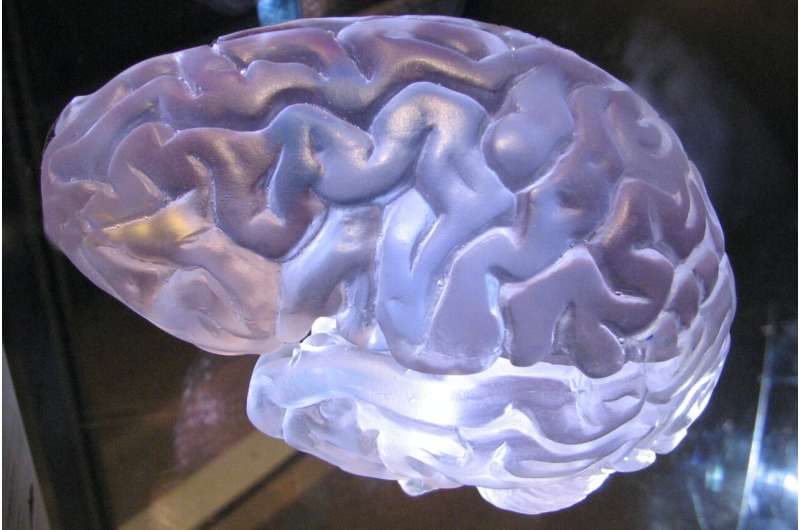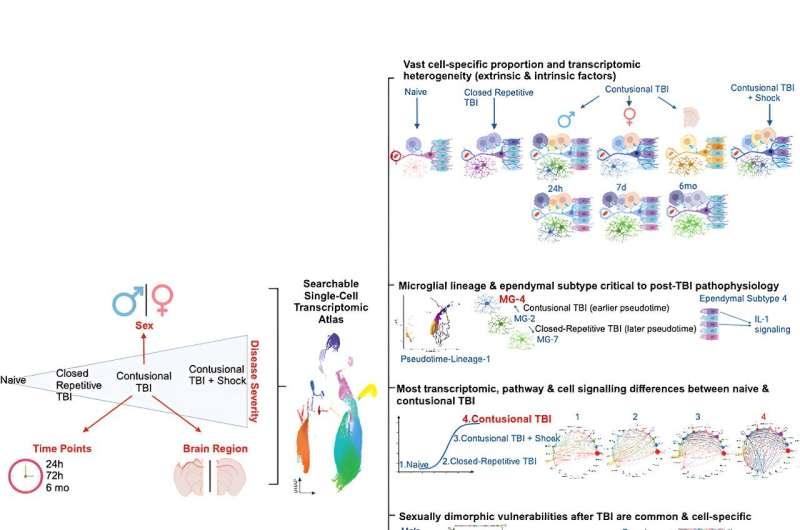This article has been reviewed according to Science X's editorial process and policies. Editors have highlighted the following attributes while ensuring the content's credibility:
fact-checked
peer-reviewed publication
proofread
New atlas aims to replace uniform traumatic brain injury treatment with precision medicine

Researchers at Phoenix's Barrow Neurological Institute and the University of Pittsburgh have created a vast interactive atlas that may eventually help doctors use precision medicine to target treatments for traumatic brain injury (TBI) patients—and could replace the existing uniform treatment model. The research is published in the journal Neuron.
With 40–50 million new cases each year, the global incidence of TBI outstrips common neurological diseases, including stroke and Alzheimer's disease. Effective treatments have remained elusive because each TBI is different, but treatments are not.
The atlas, the first of its kind, includes 334,376 cells and information about how they responded to TBI. The goal was to deconstruct TBIs at the molecular level, opening pathways for therapies based on the severity, time and brain region of the TBI.
"All of the clinical trials over the past several decades testing different therapies have failed to show benefit," said lead researcher Ruchira M. Jha, MD, MSc, director of neurocritical care research at Barrow Neurological Institute. "In large part this might be because of a 'one size fits all' approach to management—when really each patient, indeed each cell, is different."
"This atlas may ultimately help doctors use tools like biomarkers, multimodality monitoring, genomic profiling and neuroimaging to bring precision-medicine research to a field dominated by a uniform approach," Dr. Jha said. "Our searchable atlas is a foundation for future research to understand cell-specific impacts post-TBI. This is a living atlas in that we are continuing to build upon this with additional samples and variables."

A TBI happens externally, but within the brain a cascade of internal responses occurs at the molecular level. These responses are important for repair and regeneration of the brain, but they also trigger secondary responses such as seizures, neuroinflammation and neurodegeneration. The atlas will help physicians target TBIs at the molecular level, potentially improving treatment outcomes.
Researchers, including Dr. Jha, Patrick Kochanek, M.D., distinguished professor, vice chair of critical care medicine at the University of Pittsburgh, and director of the Safar Center for Resuscitation Research at the University of Pittsburgh, explored the cell-specific complexity of response to a TBI—including the effect of distance from the impact site and time from injury.
The interactive web-based platform has documented several key variables across all these variables that can be explored and customized based on individual preferences.
"To date, all clinical trials of new therapies for TBI have failed: Despite the highly complex and varied secondary injury response across the spectrum of TBI severity, therapeutic trials thus far have taken a homogeneous approach, testing a therapy across patient subgroups that share clinical characteristics in a given injury severity category," said Kochanek.
"We believe that these findings have the potential to lead to truly precision therapies targeting neuroinflammation after TBI across the injury spectrum," said Kochanek, who also directs the Safar Center for Resuscitation Research at Pitt.
"We also provide the field with a mobile app which represents a leverageable platform for future research and therapy development for TBI and TBI-linked neurodegenerative diseases."
More information: Ruchira M. Jha et al, A single-cell atlas deconstructs heterogeneity across multiple models in murine traumatic brain injury and identifies novel cell-specific targets, Neuron (2024). DOI: 10.1016/j.neuron.2024.06.021



















